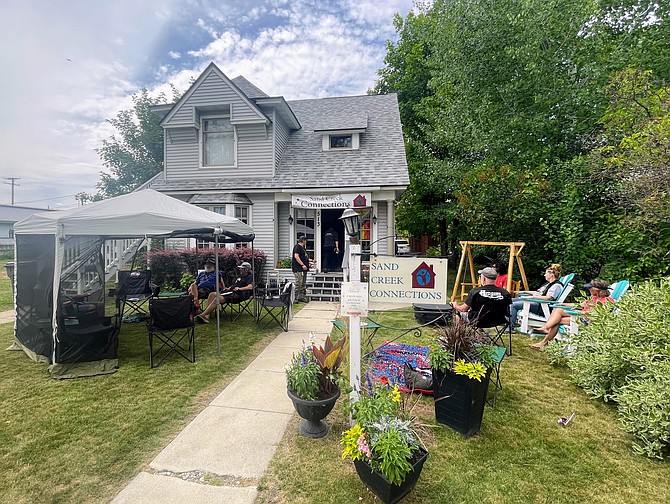NAMI Far North’s unique approach to solving the area's mental health crisis

Sand Creek Connections' participants sit out front of the house on the 4th of July.
The son of Dr. Dawn Mehra, DVM, spent his 21st birthday in a psych ward at Kootenai Health Behavioral Health in Coeur d’Alene.
When he suffered a psychotic event two years earlier, Mehra’s family was thrown into a world filled with unknowns, concerns and isolation. Those feelings of isolation and grief drove their lives, searching for answers and treatment.
“We didn’t know the world we were entering,” Mehra said. “You name the emotion and we had it, it was a rollercoaster ride of so much unknown and so many hard times.”
That journey led Mehra and her family to find the National Alliance on Mental Illness, a grassroots organization focused on bettering the lives of people who suffer from mental illness. Mehra now serves on the board of directors for NAMI’s Far North chapter based in Sandpoint, one of six NAMI affiliates in the state.
"Once treatment happened, which we got, because of the love of our community, we found the help we needed,” Mehra said. “Our NAMI support groups, MANI education, support groups, our legal system here was amazing. Everything we touched in this county was awesome.”
The Far North office has been serving the people of Bonner and Boundary counties since 2007, by providing education for families and advocating for people suffering with mental illness. In 2024, the organization expanded and joined forces with Clubhouse International to provide a first of its kind service in Idaho.
The Sand Creek Clubhouse is a non-clinical day facility for people suffering from serve mental health conditions can rebuild their sense of community. The clubhouse is free for anyone to join and functions on a structured work-ordered day.
"It’s just peers helping peers and staff facilitating that,” Mehra said. “That's how they move on, they build confidence and regain dignity and start feeling better.”
Mehra said that the clubhouse model, which is governed by Clubhouse International, has had a positive impact all over the world and that they’ve seen similar benefits at Sand Creek.
"So 45% of members at clubhouses are able to get employment again and get back into the community of their choice,” Mehra said. “The national average is 25%, so it’s doubling the people that are able to get back to work.”
The services that NAMI gives to the community, like the Sand Creek Clubhouse are invaluable to families like Mehra’s who live in North Idaho. Every county in Idaho is considered a health professional shortage area for mental health care, according to the Idaho Department of Health and Welfare, but the rural nature of the counties can exacerbate problems.
Mehra’s primary example is the lack of any crisis center dedicated to dealing with mental health events located in the two counties in which NAMI Far North operates. The nearest crisis center is located in Coeur d’Alene, which can be as much as two-hour drive for some residents and unreachable in emergencies.
Mehra said that for people suffering from mental illness a year spent in the clubhouse system is equal to a month in the hospital, but completely free and voluntary for the participants in the program.
"It’s mental therapy for the brain, like when you break a bone you get physical therapy,” Mehra said. “Think of how much you save in a week of hospitalization for someone that has a psych break, and if they are a member of a clubhouse for a year they don’t go to the hospital.”
The program is able to stay free for participants thanks to community donors and grants and Mehra said that the clubhouse has enough to stay open through 2026. She said the organization is working with the Idaho Legislature to open up a code that would allow the clubhouse to receive Medicaid funds.
Mehra said that she hopes that the Legislature will begin to view mental illness as a physical illness that requires funding to fix. She said that opening the clubhouse code, would help every facet of the state.
“You are affected by everyone’s mental health, if they just knew the cost of not treating it, this would not be happening,” Mehra said. “Open up that Medicaid code so we can have a clubhouse in every county and we can get 45% of these people back into their communities.”










